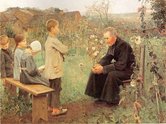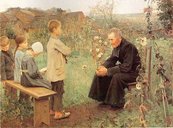 The Heidelberg Catechism: Lord's Day 31 83. Question: What are the keys of the kingdom of heaven? Answer: The preaching of the holy gospel and church discipline. By these two the kingdom of heaven is opened to believers and closed to unbelievers.[1] [1] Matt. 16:19; John 20:21-23. 84. Question: How is the kingdom of heaven opened and closed by the preaching of the gospel? Answer: According to the command of Christ, the kingdom of heaven is opened when it is proclaimed and publicly testified to each and every believer that God has really forgiven all their sins for the sake of Christ's merits, as often as they by true faith accept the promise of the gospel. The kingdom of heaven is closed when it is proclaimed and testified to all unbelievers and hypocrites that the wrath of God and eternal condemnation rest on them as long as they do not repent. According to this testimony of the gospel, God will judge both in this life and in the life to come.[1] [1] Matt. 16:19; John 3:31-36; 20:21-23. 85. Question: How is the kingdom of heaven closed and opened by church discipline? Answer: According to the command of Christ, people who call themselves Christians but show themselves to be unchristian in doctrine or life are first repeatedly admonished in a brotherly manner. If they do not give up their errors or wickedness, they are reported to the church, that is, to the elders. If they do not heed also their admonitions, they are forbidden the use of the sacraments, and they are excluded by the elders from the Christian congregation, and by God Himself from the kingdom of Christ.[1] They are again received as members of Christ and of the church when they promise and show real amendment.[2] [1] Matt. 18:15-20; I Cor. 5:3-5; 11-13; II Thess. 3:14, 15. [2] Luke 15:20-24; II Cor. 2:6-11.
0 Comments
 The Heidelberg Catechism: Lord's Day 21 54. Question: What do you believe concerning the holy catholic Christian church? Answer: I believe that the Son of God,[1] out of the whole human race,[2] from the beginning of the world to its end,[3] gathers, defends, and preserves for Himself, [4] by His Spirit and Word,[5] in the unity of the true faith,[6] a church chosen to everlasting life.[7] And I believe that I am[8] and forever shall remain a living member of it.[9] [1] John 10:11; Acts 20:28; Eph. 4:11-13; Col. 1:18. [2] Gen. 26:4; Rev. 5:9. [3] Is. 59:21; I Cor. 11:26. [4] Ps. 129:1-5; Matt. 16:18; John 10:28-30. [5] Rom. 1:16; 10:14-17; Eph. 5:26. [6] Acts 2:42-47; Eph. 4:1-6. [7] Rom. 8:29; Eph. 1:3-14. [8] I John 3:14, 19-21. [9] Ps. 23:6; John 10:27, 28; I Cor. 1:4-9; I Pet. 1:3-5. 55. Question: What do you understand by the communion of saints? Answer: First, that believers, all and everyone, as members of Christ have communion with Him and share in all His treasures and gifts.[1] Second, that everyone is duty-bound to use his gifts readily and cheerfully for the benefit and well-being of the other members.[2] [1] Rom. 8:32; I Cor. 6:17; 12:4-7, 12, 13; I John 1:3. [2] Rom. 12:4-8; I Cor. 12:20-27; 13:1-7; Phil. 2:4-8. 56. Question: What do you believe concerning the forgiveness of sins? Answer: I believe that God, because of Christ's satisfaction, will no more remember my sins,[1] nor my sinful nature, against which I have to struggle all my life,[2] but He will graciously grant me the righteousness of Christ, that I may never come into condemnation.[3] [1] Ps. 103:3, 4, 10, 12; Mic. 7:18, 19; II Cor. 5:18-21; I John 1:7; 2:2. [2] Rom. 7:21-25. [3] John 3:17, 18; 5:24; Rom. 8:1, 2. |
The Heidelberg
|
 RSS Feed
RSS Feed
